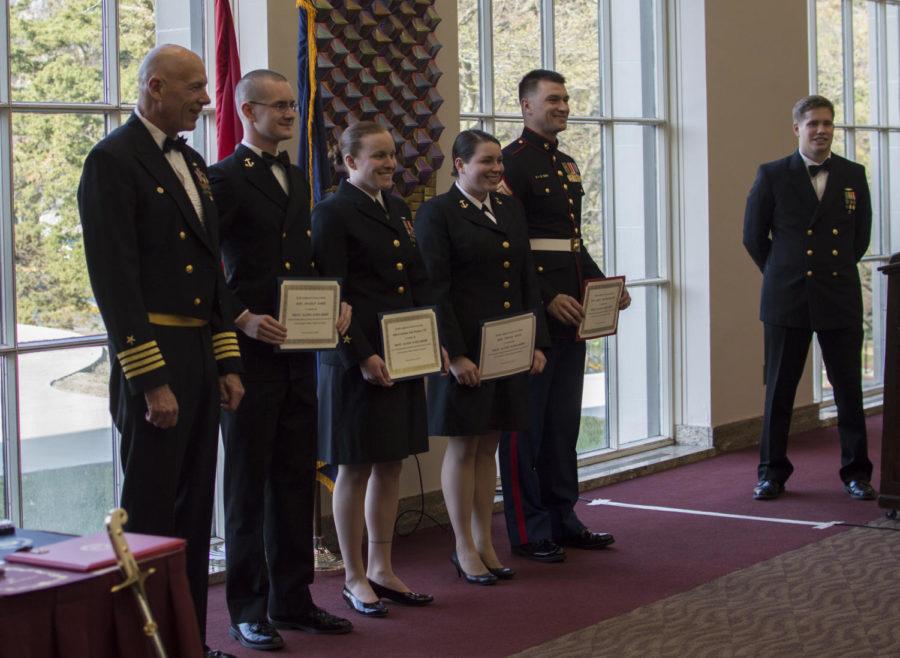Changing Perceptions: Speaker offers advice from own experiences serving in the Navy
Charlie Coffey/Iowa State Daily
Members of the ROTC Cyclone Battalion receive awards during the 2015 Navy ROTC Awards Ceremony on April 11 in the Campanile Room of the Memorial Union.
April 13, 2015
An Iowa State Navy ROTC midshipman walked into a classroom after drill in the mid ’70s, amid the nation’s public controversy surrounding the Vietnam War. Seeing his uniform, the professor told him he could drop the class or stay and take an F. He dropped the class.
“Unfortunately, there were a few very liberal leaning instructors and professors who voiced their views,” said retired Navy Capt. Douglas MacCrea. “Who am I, a 20 year old, to tell a professor, ‘you’re wrong?’”
MacCrea started at Iowa State near the end of the “very unpopular” Vietnam War, he said. He went on to commission and served a career in the Navy, which brought him back to Iowa State as the NROTC commanding officer and professor of naval science from 2004 to 2007. He was the speaker and guest of honor at the NROTC dining out and awards ceremony Saturday in the MU.
Today, he said society’s perception of the military is more positive and midshipmen get some respect on campus.
“I think at this time in our nation’s history, the nation has embraced the military,” said Capt. Ricks Polk, NROTC commanding officer, professor and chair of the Naval Science department. “We come back in airports and transportation hubs around the nation and you see people clapping for the sailors, marines and army soldiers.”
It wasn’t always that way. After the Vietnam War, many who served were met with animosity by the public.
“The military is an instrument of foreign policy,” MacCrea said. “They don’t set the policy. The military executes policy set by elected officials. I think in some cases back in the mid ’70s, people missed that.”
Polk said the public’s perception of the military is cyclical — that sometimes it is seen as necessary and sometimes as a necessary evil. Keeping the public informed about the military is important, he said.
After 9/11, people have had a better understanding and treatment of the military, said Staff Sgt. Christopher Harrison, assistant marine officer instructor.
“At this time, they embrace us because we are able to defend what America holds dear, and that’s our freedom,” Polk said.
In his speech, MacCrea offered insights from his Navy career and advice to take military leadership into civilian positions after service.
“It wasn’t until I retired and went to work in the private sector that I realized just how starved the private sector is for leadership,” he said.
Through the NROTC program, midshipmen have leadership roles. Because of turnover in civilian jobs, Polk said it can be difficult to build comradery, which is necessary in military missions.
“Many times, the mission might be the difference between life and death,” Polk said. “There’s usually not that same thing on the line in any business or organization.”
Knowing the stakes in a life or death mission forces members of the military to be good leaders, Polk said.
NROTC midshipmen command an increasing number of people as they progress through the program.
“It’s a benefit that transfers over,” Harrison said. “Somebody is in charge of somebody, always.”
MacCrea thanked parents, family members and dates for their support of the midshipmen now and through the “difficult tasks that lie ahead.”
“You don’t know how important that is right now, but you will reflect upon that later on,” MacCrea said. “Without their support, putting on a uniform day in and day out, or even part time, is very very hard.”

















